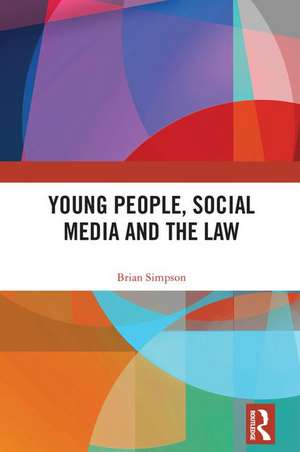Young People, Social Media and the Law
Autor Brian Simpsonen Limba Engleză Hardback – 30 noi 2017
| Toate formatele și edițiile | Preț | Express |
|---|---|---|
| Paperback (1) | 325.53 lei 3-5 săpt. | +19.16 lei 4-10 zile |
| Taylor & Francis – 21 mar 2019 | 325.53 lei 3-5 săpt. | +19.16 lei 4-10 zile |
| Hardback (1) | 1053.92 lei 6-8 săpt. | |
| Taylor & Francis – 30 noi 2017 | 1053.92 lei 6-8 săpt. |
Preț: 1053.92 lei
Preț vechi: 1285.26 lei
-18% Nou
Puncte Express: 1581
Preț estimativ în valută:
201.72€ • 207.88$ • 170.30£
201.72€ • 207.88$ • 170.30£
Carte tipărită la comandă
Livrare economică 03-17 martie
Preluare comenzi: 021 569.72.76
Specificații
ISBN-13: 9781138814431
ISBN-10: 1138814431
Pagini: 194
Dimensiuni: 156 x 234 x 13 mm
Greutate: 0.43 kg
Ediția:1
Editura: Taylor & Francis
Colecția Routledge
Locul publicării:Oxford, United Kingdom
ISBN-10: 1138814431
Pagini: 194
Dimensiuni: 156 x 234 x 13 mm
Greutate: 0.43 kg
Ediția:1
Editura: Taylor & Francis
Colecția Routledge
Locul publicării:Oxford, United Kingdom
Public țintă
Postgraduate and UndergraduateCuprins
1. Moral panics, childhood, social media and the law 2. Recreating families in social media 3. Social media, young people and political accountability 4. Schools, young people and social media: surveillance and the role model void 5. Working in the online society: social media and young people in new workplace 6. Crime, Identity and Gender: how social media opens new worlds of hope and exploitation 7. ‘Don’t mention the porn’: social media and the rise of the sexual child 8. The New Wasteland: Law, Many Publics and the Loss of Interest
Descriere
This book critically confronts perceptions that social media has become a ‘wasteland’ for young people. The legal tendency to focus exclusively on the need to protect and control their online presence and privacy, whilst tending to suspect, or to criminalise, their use of it – has obscured the potential of social media to help young people to participate more fully as citizens in society. Drawing on sociological work on the construction of childhood, and engaging a wide range of national and international legal material, this book argues that social media may yet offer the possibility of an entirely different – and more progressive –conceptualisation of children and youth.




















